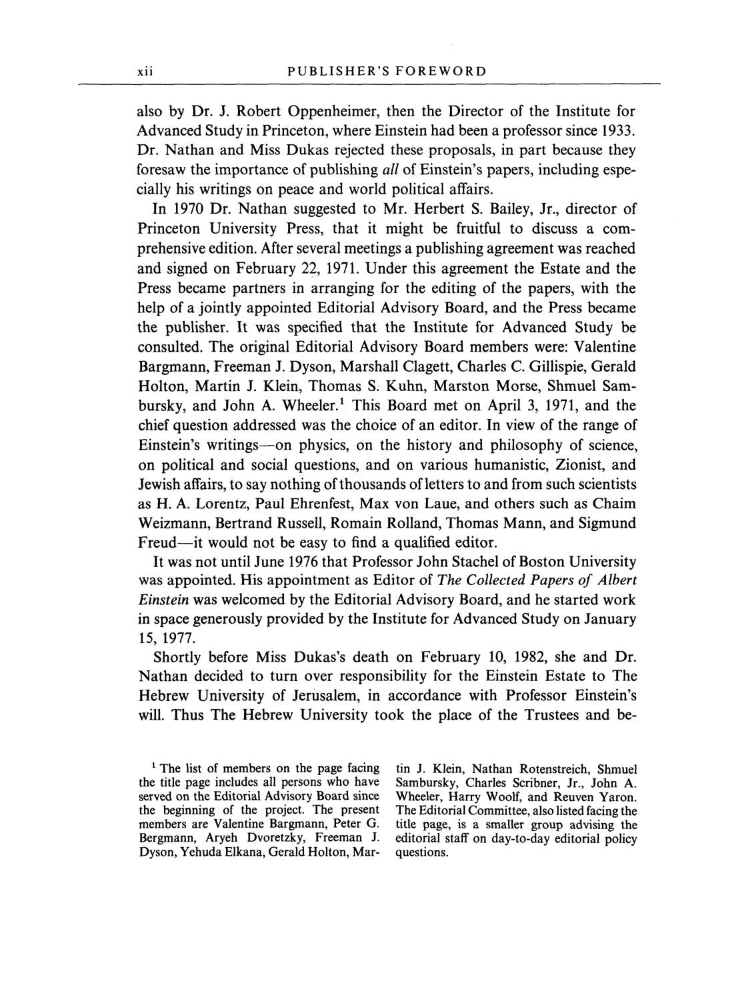xii PUBLISHER'S FOREWORD also by Dr. J. Robert Oppenheimer, then the Director of the Institute for Advanced Study in Princeton, where Einstein had been a professor since 1933. Dr. Nathan and Miss Dukas rejected these proposals, in part because they foresaw the importance of publishing all of Einstein's papers, including espe- cially his writings on peace and world political affairs. In 1970 Dr. Nathan suggested to Mr. Herbert S. Bailey, Jr., director of Princeton University Press, that it might be fruitful to discuss a com- prehensive edition. After several meetings a publishing agreement was reached and signed on February 22, 1971. Under this agreement the Estate and the Press became partners in arranging for the editing of the papers, with the help of a jointly appointed Editorial Advisory Board, and the Press became the publisher. It was specified that the Institute for Advanced Study be consulted. The original Editorial Advisory Board members were: Valentine Bargmann, Freeman J. Dyson, Marshall Clagett, Charles C. Gillispie, Gerald Holton, Martin J. Klein, Thomas S. Kuhn, Marston Morse, Shmuel Sam- bursky, and John A. Wheeler.1 This Board met on April 3, 1971, and the chief question addressed was the choice of an editor. In view of the range of Einstein's writings-on physics, on the history and philosophy of science, on political and social questions, and on various humanistic, Zionist, and Jewish affairs, to say nothing of thousands of letters to and from such scientists as H. A. Lorentz, Paul Ehrenfest, Max von Laue, and others such as Chaim Weizmann, Bertrand Russell, Romain Rolland, Thomas Mann, and Sigmund Freud-it would not be easy to find a qualified editor. It was not until June 1976 that Professor John Stachel of Boston University was appointed. His appointment as Editor of The Collected Papers of Albert Einstein was welcomed by the Editorial Advisory Board, and he started work in space generously provided by the Institute for Advanced Study on January 15, 1977. Shortly before Miss Dukas's death on February 10, 1982, she and Dr. Nathan decided to turn over responsibility for the Einstein Estate to The Hebrew University of Jerusalem, in accordance with Professor Einstein's will. Thus The Hebrew University took the place of the Trustees and be- 1 The list of members on the page facing the title page includes all persons who have served on the Editorial Advisory Board since the beginning of the project. The present members are Valentine Bargmann, Peter G. Bergmann, Aryeh Dvoretzky, Freeman J. Dyson, Yehuda Elkana, Gerald Holton, Mar- tin J. Klein, Nathan Rotenstreich, Shmuel Sambursky, Charles Scribner, Jr., John A. Wheeler, Harry Woolf, and Reuven Yaron. The Editorial Committee, also listed facing the title page, is a smaller group advising the editorial staff on day-to-day editorial policy questions.
